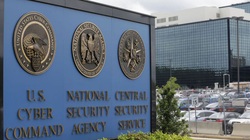
Though the bill does not specifically mention the National Security Agency (NSA), its sponsors, Senators Ted Lieu (D) and Joel Anderson (R), said the legislation does target the spy agency.
Anderson was quoted by U.S. News as saying that he doubts the NSA would even want to operate in California:
I can’t imagine they would want to locate here in California; we have not given them a warm welcome … [and] we’re trying to draw a bright blue line for all state employees. We’re trying to use the 10th Amendment to enforce the Fourth Amendment.
The 10th Amendment explains the concept of federalism and is a keystone of states’ rights, reading: “The powers not delegated to the United States by the Constitution, nor prohibited by it to the States, are reserved to the States respectively, or to the people.”
The Fourth Amendment, which protects the citizens’ right to privacy, is cherished by civil libertarians as much as strict constitutionalists. It states:
The right of the people to be secure in their persons, houses, papers, and effects, against unreasonable searches and seizures, shall not be violated, and no Warrants shall issue, but upon probable cause, supported by Oath or affirmation, and particularly describing the place to be searched, and the persons or things to be seized.
The practice of a warrantless search — a clear violation of the Fourth Amendment — has become a major issue since the federal government increased its surveillance activities following the 9/11 attacks.
In an article posted by The New American, Thomas R. Eddlem cited a report in the Washington Post last August 15 stating that its audit of the NSA “dated May 2012, counted 2,776 incidents in the preceding 12 months of unauthorized collection, storage, access to or distribution of legally protected communications.”
The information on NSA abuse, the Post reported, had been “provided earlier this summer to the Washington Post by former NSA contractor Edward Snowden.”
“What no country has been able to take from us through force the NSA is taking in the dark of night,” Senator Anderson continued.
The bill’s other sponsor, Ted Lieu, told the press,
The Fourth Amendment to the U.S. Constitution is very clear. It says the government shall not engage in unreasonable search and seizure. The National Security Agency’s massive and indiscriminate collecting of phone data on all Americans, including more than 38 million Californians, is a threat to our liberty and freedom.
Lieu’s spokesman, Jeff Gozzo, said that the California bill has progressed the farthest of several similar measures that have been introduced in eight states, including Alaska, Arizona, and Oklahoma. The Fourth Amendment Protection Act would not allow California’s law enforcement and other officials to assist federal agencies looking for records of phone calls, Internet use, or other electronic activity by state residents unless a warrant is issued by a judge.
U.S. News noted that one federal judge has found the NSA’s widespread collection of U.S. phone records to be very likely unconstitutional. U.S. District Judge Richard Leon of Washington, D.C., ruled on December 16 that the agency’s “almost Orwellian” collection almost certainly violates Americans’ Fourth Amendment rights.
Leon had obviously read George Orwell’s classic, 1984, in which the regime in power spied on its citizens through the omnipresent placement of surveillance cameras (even in private homes) and reminded the population of its power through large billboards proclaiming “Big Brother Is Watching You.”
It is interesting that the Russian media has reported on this story, perhaps an indication that Russians have firsthand, unpleasant memories of what it is like to live under a regime that constantly spies on it citizens. The Russian RT news network even provided details missing from the U.S. reports, including:
Earlier this month, the House Judiciary Committee voted 32-0 to move along legislation, which would bring a halt to the NSA’s controversial activities, with amendments to the USA Freedom Act. As part of the bill, the NSA would need to prove to a judge that an individual is somehow connected to terrorism before being granted access to their personal data.
We noted in our article of May 6 that the USA Freedom Act (H.R. 3361) was introduced last October 29 by Rep. Jim Sensenbrenner (R-Wis.), chairman of Judiciary’s Crime, Terrorism, Homeland Security, and Investigations Subcommittee, to reform the federal government’s intelligence-gathering programs — especially those conducted by the NSA — operated under the Foreign Intelligence Surveillance Act (FISA).
Following the 32-0 vote reported by RT, the bill was amended and reported to the Rules Committee, and on May 21 the House voted 231-190 to reconsider the measure. It currently has 152 cosponsors.
The bill’s Senate counterpart, S. 1599, the Uniting and Strengthening America by Fulfilling Rights and Ending Eavesdropping, Dragnet-collection, and Online Monitoring Act (USA Freedom Act) has 21 cosponsors and is currently in the Senate Judiciary Committee.
As we stated in our May 6 article, the amended version of H.R. 3361 that is likely to pass after various compromises is far from ideal. National Journal reported that the “bipartisan substitute” offered by Reps. Goodlatte, Conyers, and the others would “prohibit the bulk collection of data under Section 215 of the Patriot Act but keep intact the ‘relevancy’ standard for collection authority” while “the original Freedom Act had sought to completely rewrite the relevancy standard.”
What this means, basically, is that the latest amendments likely to be made to the Freedom Act would allow the NSA to keep the agency’s carte blanche authority to define the relevancy of the data it wants to collect, thus making it a weaker piece of legislation than the original version. However, H.R. 3361 is still stronger than an alternative piece of legislation, the FISA Transparency and Modernization Act, H.R. 4291.
It is encouraging that Sensenbrenner, who introduced H.R. 3361, has had an apparent change of heart since he introduced the USA PATRIOT Act, H.R. 3162, in the House back on October 23, 2001. (The NSA’s Metadata Collection Program derives its authority from Section 215 of the USA PATRIOT Act.) The Wisconsin congressman expressed reservations about the abuse of the PATRIOT Act in a statement posted on his congressional webpage on June 6, 2013: “I do not believe the broadly drafted FISA [Foreign Intelligence Surveillance Act] order is consistent with the requirements of the Patriot Act. Seizing phone records of millions of innocent people is excessive and un-American.”
Any legislation that hampers the NSA’s unconstitutional fishing expeditions — whether at the federal level like H.R. 3361 or at the state level like California’s SB 828 — is certainly a step in the right direction. But, ultimately, to restore our freedom, it will take a complete repeal of the PATRIOT Act and all other unconstitutional usurpations of power that took place following the attacks of September 11, 2001.



 RSS Feed
RSS Feed